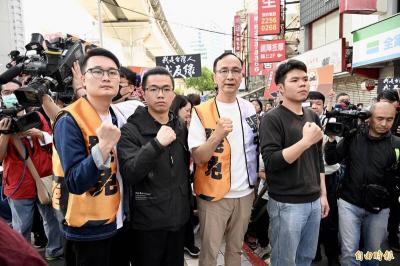The legislature passed an amendment to the Gender Equality in Employment Act (性別工作平等法) yesterday to make paternity leave longer when spouses are in labor, grant five paid days off for pregnant employees to undergo antenatal examinations and clarify that half-pay is guaranteed for menstrual leave.
Revisions have been made to seven articles of the existing act, which stipulates that while employees’ spouses are in labor, their employers must grant them three paid days off as paternity leave, but which has no regulations on working pregnant women’s welfare concerning pre-birth examinations.
The newly passed amendments grant five more birth-related paid days off to pregnant employees for prenatal checkups, an increase from the existing maternity leave granted before and after childbirth for a combined period of eight weeks.
Also granted by the new law is an extension of paternity leave for employees with spouses in labor to five days.
“With paternity leave extended to five days that could be combined with two weekends, [employees with spouses in labor] can now have a total of nine days to stay with their spouses and take care of the baby,” said Chinese Nationalist Party (KMT) Legislator Alicia Wang (王育敏), convener of the legislature’s Social Welfare and Environmental Hygiene Committee.
The Ministry of Labor has estimated that about 174,000 employees will benefit from the change every year and that employers need to shoulder an extra annual expenditure of NT$470 million (US$15.2 million).
About 140,000 pregnant employees will benefit from the days off for pre-birth examinations annually, costing employers about NT$790 million, the ministry said.
The existing act allowed one day of menstrual leave each month and if the cumulative menstrual leave did not exceed three days in a year they were not to be counted toward days off for sick leave and be entitled to half-pay, while the amendment makes the three-day non-sick-leave menstrual leave half-paid, rather than unpaid.
Employees now may also apply for unpaid parental leave before any of their children reach the age of three years old after being employed for six months, instead of one year under the existing law.
Adoptive parents are now also entitled to non-pay parental leave if the adoptive children are under three years of age, Wang said.
“Other improvements include the requirement for employers [hiring more than 250 employees] to set up not only child-care facilities [pursuant to the current regulations], but also lactation rooms and the strengthening of penalties for gender discrimination,” Democratic Progressive Party Legislator Yu Mei-nu (尤美女) said.
Penalties related to gender discrimination have also been raised from between NT$100,000 and NT$500,000 (US$3,225 and US$16,126) to between NT$300,000 and NT$1.5 million.
However, Yu later expressed concern about implementing the measures, saying that if employers are not well supervised by the government the measures would be toothless.
“I want to remind President Ma Ying-jeou’s (馬英九) administration that the previous amendments passed on May 30 included my proposal to make public the company names and the names of the person in charge of companies that violate the act,” Yu wrote on Facebook.
“The transparency and the subsequently formed social pressure would make employers take their responsibilities for a gender-friendly workplace more seriously,” she wrote.

The Ministry of Economic Affairs has fined Taobao NT$1.2 million (US$36,900) for advertisements that exceeded its approved business scope and ordered the Chinese e-commerce platform to make corrections in the first half of this year or its license would be revoked. Lawmakers have called for stricter supervision of Chinese e-commerce platforms and more stringent measures to prevent China from laundering its goods through Taiwan as US President Donald Trump’s administration cracks down on origin laundering. The legislature’s Finance Committee yesterday met to discuss policies to prevent China from dumping goods in Taiwan, inviting government agencies to report on the matter. Democratic Progressive Party

Taiwan and its Pacific ally Tuvalu on Tuesday signed two accords aimed at facilitating bilateral cooperation on labor affairs, according to Taiwan’s Ministry of Foreign Affairs (MOFA). The governments inked two agreements in Taipei, witnessed by Foreign Minister Lin Chia-lung (林佳龍) and visiting Deputy Tuvaluan Prime Minister Panapasi Nelesone, MOFA said in a news release. According to MOFA, the agreements will facilitate cooperation on labor issues and allow the two sides to mutually recognize seafarers’ certificates and related training. Taiwan would also continue to collaborate with Tuvalu across various fields to promote economic prosperity as well as the well-being of their

The Taipei District Prosecutors’ Office has continued its investigation into allegations of forged signatures in recall efforts today by searching the Chinese Nationalist Party’s (KMT) city chapter and questioning several personnel including the chapter director, according to media reports. Among those questioned and detained were KMT Taipei chapter director Huang Lu Chin-ju (黃呂錦茹), chapter secretary-general Chu Wen-ching (初文卿), chapter secretary Yao Fu-wen (姚富文) and first district committee executive director Tseng Fan-chuan (曾繁川). Prosecutors said they would not confirm reports about who had been summoned. The investigation centers on allegations that the ongoing recall campaigns targeting Democratic Progressive Party legislators Rosalia Wu (吳思瑤)

Several Chinese Nationalist Party (KMT) officials including Chairman Eric Chu (朱立倫) are to be summoned for questioning and then transferred to prosecutors for holding an illegal assembly in Taipei last night, the Taipei Police said today. Chu and two others hosted an illegal assembly and are to be requested to explain their actions, the Taipei City Police Department's Zhongzheng (中正) First Precinct said, referring to a protest held after Huang Lu Chin-ju (黃呂錦茹), KMT Taipei's chapter director, and several other KMT staffers were questioned for alleged signature forgery in recall petitions against Democratic Progressive Party (DPP) legislators. Taipei prosecutors had filed